|
|
|
Sort Order |
|
|
|
Items / Page
|
|
|
|
|
|
|
| Srl | Item |
| 1 |
ID:
100748
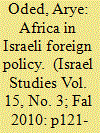

|
|
|
|
|
| Publication |
2010.
|
| Summary/Abstract |
In the 1960s, when most African states south of the Sahara achieved independence, Israel was one of the first countries to establish diplomatic relations with them and to offer them assistance. Israel was a major "donor" in Africa, and Israeli ambassadors operated in 33 countries. Africa had an important place in Israel's foreign policy. However, in 1973, during and after the Yom Kippur War, in an unexpected and severely disappointing move, almost all African countries severed their diplomatic relations with Israel. Ten years later, Israel returned, gradually, to Africa. The article examines the factors that influenced these changes and to what extent Israel drew the necessary conclusions after returning to Africa. Special emphasis is given to the making of Israel-African policy in the 1960s, which still remains the basis of Israel's present activities on the continent, although with significant changes.
|
|
|
|
|
|
|
|
|
|
|
|
|
|
|
|
| 2 |
ID:
115590
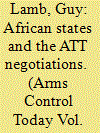

|
|
|
| 3 |
ID:
078437
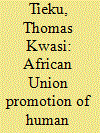

|
|
|
| 4 |
ID:
100326
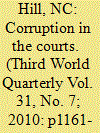

|
|
|
|
|
| Publication |
2010.
|
| Summary/Abstract |
The exponential growth in the size of the private security sector (PSS) in Africa has helped give the issue of its regulation new importance. Yet the ongoing debates over what laws should be passed and by whom tend to ignore the more basic and arguably urgent question of whether African states' justice systems are sufficiently robust to give this legislation meaning. The aim of this paper is to cast some much needed light on this topic by drawing lessons from Nigeria's current experiences. By tracing the development of its PSS code and examining instances of malpractice in its justice system, the article argues that its regulatory framework is fundamentally compromised by corruption.
|
|
|
|
|
|
|
|
|
|
|
|
|
|
|
|
| 5 |
ID:
190933
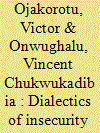

|
|
|
|
|
| Summary/Abstract |
To achieve development in a state of insecurity is a mirage. Africa is caught in this web, as every sub-region faces security challenges. The Millennium Development Goals (MDGs) and the Sustainable Development Goals (SDGs) were developed as frameworks to fast track development in developing countries and sustain it in developed countries through global partnerships. This study is an advocacy to reinvent the role development partners can play to prevent and contain insecurity in the continent. It examines insecurity and development scenarios of countries in Africa, relying on the analysis of secondary data. Based on the triangulation of the Development Partnership Approach and Structural-Functional Approach as the framework for the study analysis, the findings suggest that development partners need to do more to prevent and contain insecurity in the region. The study proposes ways the development partners can achieve these.
|
|
|
|
|
|
|
|
|
|
|
|
|
|
|
|
| 6 |
ID:
133809
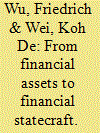

|
|
|
|
|
| Publication |
2014.
|
| Summary/Abstract |
Over the past few decades, China has accumulated over US$3.4 trillion of official foreign exchange reserves as it rises to become a global power. Do China's financial assets increase its ability to pursue its national interests internationally? With the globalisation and rising influence of Chinese state-owned enterprises, state-owned banks and sovereign wealth fund, as well as China's growing clout in several regional groupings, it is clear that China does possess the necessary mechanisms to assert its financial power. This article examines the efficacy and limitations of these mechanisms in Africa and Latin America, in the economic and political domains. In the economic domain, China has consistently used foreign oil contracts and acquisitions to secure direct oil flow from developing nations. An analysis of recent cases shows that while China is able to successfully harness its financial power in its pursuit of oil, it needs to fulfil its promises to the satisfaction of the recipient countries in order to maintain the value of its offers. In the political domain, China has used its financial assets to purchase diplomatic allegiance from various African and Latin American countries in support of its One-China policy. Studying both successful and unsuccessful cases reveals that while China is generally able to use its financial power in third-world countries against Taiwan successfully, its national goals have, in recent years, shifted to the economic realm, even with countries that still recognise the Taipei government.
|
|
|
|
|
|
|
|
|
|
|
|
|
|
|
|
| 7 |
ID:
120446
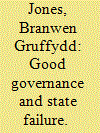

|
|
|
|
|
| Publication |
2013.
|
| Summary/Abstract |
Current international policy discourse routinely characterizes the condition of African states in terms of either 'good governance', on one hand, or 'fragility' and 'failure', on the other. This conceptual vocabulary and analytical approach has become entrenched within the public imagination more broadly, and is reproduced in academic analysis, largely without serious questioning or critique. Some scholars, however, have argued that the entire discourse of 'state failure' should be rejected as a valid approach to understanding, analysis and explanation of social and political conditions in Africa. This position seeks both to demonstrate the analytical and explanatory emptiness of the conceptual framework of 'state failure', and to reject the uncritical adoption of strands of imperial discourse by academic scholars. This article contributes to this position by examining the failed state discourse as a modern form of racialized international thought. It argues that the discourse must be recognized as a contemporary successor to a much longer genealogy of imperial discourse about Africa and other non-European societies.
|
|
|
|
|
|
|
|
|
|
|
|
|
|
|
|
| 8 |
ID:
078436
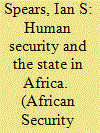

|
|
|
| 9 |
ID:
129501
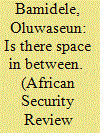

|
|
|
|
|
| Publication |
2014.
|
| Summary/Abstract |
The politicisation of religion in Africa is causing the international community growing concern, particularly the smouldering hatred between Muslims and Christians. The rising wave of religious violence across the continent has given rise to a proliferation of arms that has led to armed struggle in many African states. This paper sets out to examine the recurring issue of religion and armed conflicts in some African states. It will consider two monotheistic religions - Christianity and Islam - and the way they have interacted with each other in the region. And, finally, it examines the different ways in which religious activities are related to armed conflict in northern Nigeria, northern Uganda, Sudan, Somalia and Rwanda.
|
|
|
|
|
|
|
|
|
|
|
|
|
|
|
|
| 10 |
ID:
120920
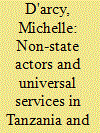

|
|
|
|
|
| Publication |
2013.
|
| Summary/Abstract |
In recent years over half of all African states have re-introduced some form of universal basic service provision, though many more have done so in education when compared with health. Most existing explanations of these developments have emphasised the importance of demand side factors associated with democratisation. This paper argues that while democratisation has been important in generating pressure for reform, alliances with actors outside the state - such as donors and non-state service providers - have been the critical enabling factor allowing weak states to overcome their capacity constraints and respond. Two illustrative case studies are used to show how variation in alliance opportunities has led to differences in outcomes both between social sectors and across countries. An inter-sector comparison of health and education policy in Tanzania shows how a difference in donor policy preferences between sectors - donors having converged behind the principle of universal primary education but not universal healthcare - has led to variation in alliance opportunities and hence policy outcomes. A 'least likely' case of healthcare reform in Lesotho shows how an alliance with a non-state provider has made difficult reforms possible.
|
|
|
|
|
|
|
|
|
|
|
|
|
|
|
|
| 11 |
ID:
117517
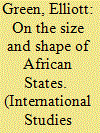

|
|
|
|
|
| Publication |
2012.
|
| Summary/Abstract |
African states are both unusually large and well known for having artificial borders created during the colonial period. While African state size and shape have been previously shown to be correlated with negative development outcomes, no one has heretofore examined the origins of either phenomenon. Here, I show that African state size and shape are not arbitrary but are rather a consequence of Africa's low pre-colonial population density, whereby low-density areas were consolidated into unusually large colonial states with artificial borders. I also show that state size has a strong negative relationship with pre-colonial trade and that trade and population density alone explain the majority of the variation in African state size. Finally, I do not find a relationship between population density and state size or shape among non-African former colonies, thereby emphasizing the distinctiveness of modern African state formation.
|
|
|
|
|
|
|
|
|
|
|
|
|
|
|
|
| 12 |
ID:
172851
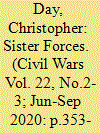

|
|
|
|
|
| Summary/Abstract |
In many African states, park rangers perform a variety of roles as armed state actors. Facing the overlapping challenges of wildlife management and regime security, many have become increasingly militarized, with significant degree of variation. Using case studies from Uganda, Rwanda, Democratic Republic of Congo, and South Sudan, this article provides an expanded conceptualization of militarization that configures two characteristics of Africa’s park rangers: 1) their integration into or insulation from the state security apparatus, and 2) their coercive roles of either law enforcement or combat. The article builds an argument that takes into account colonial institutions and civil-military relations.
|
|
|
|
|
|
|
|
|
|
|
|
|
|
|
|
| 13 |
ID:
133413
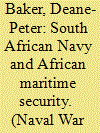

|
|
|
|
|
| Publication |
2012.
|
| Summary/Abstract |
The onset of pirate attacks on merchant vessels off the Horn of Africa in recent years has put Africa's maritime security increasingly in the international spotlight. Recent times have also seen the advent of the African Union and with it a commitment to "African solutions to African problems." Despite this, African
states have made little active contribution to securing Africa's maritime domains. Yet, as the scholar and analyst Augustus Vogel, of the Africa Center for Strategic Studies in Washington, D.C., points out, doing so
|
|
|
|
|
|
|
|
|
|
|
|
|
|
|
|
| 14 |
ID:
119120
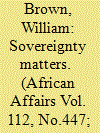

|
|
|
|
|
| Publication |
2013.
|
| Summary/Abstract |
This article critiques the predominant opinion that aid undermines the sovereignty of African states. This claim implies not only that a recipient state's policy autonomy is curtailed by development assistance, but also more fundamentally that the politico-legal independence of the state itself is being challenged. While the former is often the case, the latter is not. Drawing a conceptual and analytical distinction between sovereignty as a right to rule and national control over policy and outcomes, the article develops a more accurate identification of the areas in which aid, as a particular form of external influence, does and does not have an impact on recipient states. It argues that sovereignty as a right to rule constitutes the very basis of the aid relationship, and endows African states with the agency with which to contest the terms of aid deals. The article thus provides a new reading of the politics of aid and, by reasserting the centrality of sovereignty as an organizing institution in contemporary aid relations, supports rather than questions the relevance of the discipline of International Relations to African studies.
|
|
|
|
|
|
|
|
|
|
|
|
|
|
|
|
|
|
|
|
|